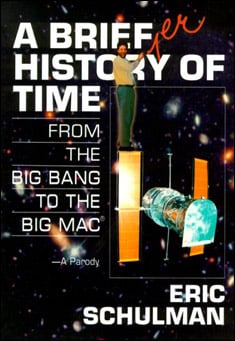From the Big Bang to the evolution of humans to the resignation of Richard Nixon, A Briefer History of Time is a highly irreverent, historically entertaining, and scientifically accurate overview of the 53 most important cosmic milestones of the last 14 billion years.
You'll learn why--even though the Universe is expanding--it never gets any easier to find a parking place. And Martha Stellar will show you how to make a star. And you'll read a classic potboiler account of the origin of life on Earth ("It was a dark and stormy night. In the shallow tide pool, a nucleic acid base collided with a sugar molecule. An amino acid sank beneath the murky depths . . . .")
Excerpt:
I decided to try to write a popular book about the history of the universe after I participated in the Seventh First Annual Ig Nobel Prize Ceremony at Harvard University in 1997. A considerable number of such books had already been written, of course, ranging from the very informative and humorous, such as Larry Gonick's The Cartoon History of the Universe, to the not-so-informative or humorous, which I will not identify. However, I felt that none of them really addressed the questions that had led me to study science in the first place: Where are we now? Where have we been? Is there an amusing and informative way of describing the journey? These questions are of interest to us all, or at least to all of us reading this particular book.
The twentieth century saw scientific fields becoming so complex that only a small number of specialists are able to master their techniques and the mathematics used to describe them. And very few of these people have the time and inclination to write amusing books describing the highlights, not only of their own field, but also of other relevant fields. That is what I have attempted to do in this book. It is up to the reader to judge whether I have succeeded.
I read somewhere that each equation included in a popular science book will halve the sales, but that this effect does not occur with Einstein's famous equation E=mc2. Can you guess which equation I included in this book?
In reading this book you will probably encounter some terms with which you are unfamiliar. You will not be tested on these terms, but should wish to review them, feel free to use the extensive glossary at the end of the book.
Each of the fifty-three chapters in this book represents a significant event in the history of the universe. The first page of each chapter lets you know where and when the event occurred. Time points early in the history of the universe give the time elapsed since the Big Bang—these are usually written in scientific notation. You can look at the glossary entry on “scientific notation” for more information on how to interpret these numbers.
Thank you for buying this book. (If you are just browsing, please reread this sentence after you purchase it; if you have checked it out of the library, please thank the librarian and suggest that extra copies be ordered.) I hope that you enjoy it, that you learn from it, and that you recommend it to friends, relatives, coworkers, acquaintances, bartenders, bus drivers, flight attendants, random passers-by, and pretty much anyone else you happen to meet.




